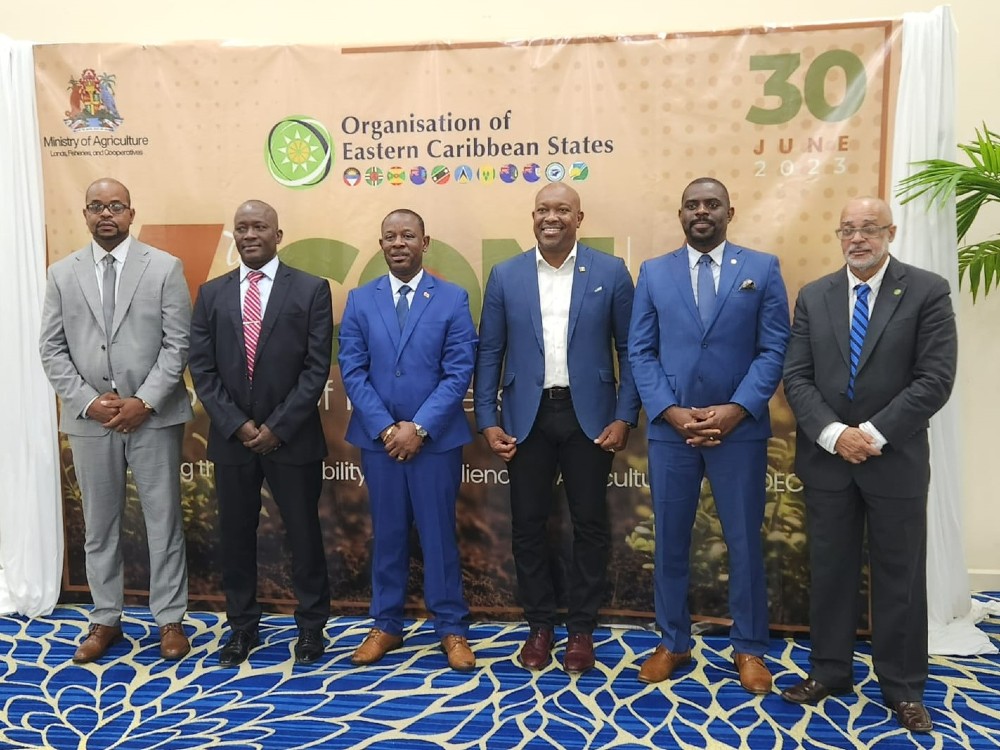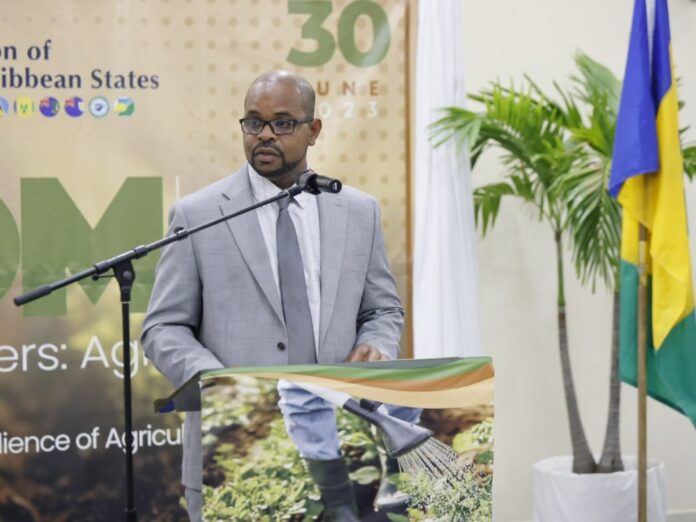
Dominica’s Agriculture Minister, Roland Royer has called on OECS Governments to improve coordination and technical cooperation on agriculture to achieve the region’s goals for food security and increased productivity.
Royer, the Chair of the OECS Council of Ministers: Agriculture, addressed the 7th Meeting of the Council in Grenada on Friday, June 30.
“We believe that through shared knowledge, best practices, research and development, innovation and the facilitation of agricultural trade, finance, and investment we can achieve much as a grouping.
“We must prioritize technical and business activities that strengthen our capacity to increase the productivity and regional trade of agricultural products and the demand for healthy food to reverse the increasing trends of the incidence of non-communicable diseases (NCDs),” the Minister stated.
He said there is a need across the region to address labour shortages in farming, the potential loss of the rich biodiversity of the islands and the threat posed by emerging agricultural pests and diseases.
“These challenges are not unique to Dominica, therefore the collaborative effort and coordination critical for retooling the agricultural sector to enhance our respective national production and marketing capacities and for building sustainable, resilient, and competitive agriculture, must be captured in our discussions on the FAST strategy,” he advised.

The Grenada meeting was convened to determine priority actions and interventions that could be pursued at the regional level for the implementation of the OECS Food and Agriculture Systems Transformation (FAST) Strategy. The strategy aims to establish competitive and sustainable food and agriculture production, processing and distribution practices that will result in increased consumption of affordable, quality, and nutritious food, increased food self-reliance and increased social and economic development.
The agriculture ministers have endorsed three core areas under the FAST Strategy, based on recommendations by senior officials of agriculture from a FAST Prioritization Workshop convened on June 29, chaired by Permanent Secretary in the Ministry of Agriculture, Fisheries, Blue and Green Economy, Reginald Severin.
The three areas will be used to develop the OECS Commission work programme on Agriculture for the next three years, namely private sector development: production processing and distribution; transport, logistics and trade; and climate resilient agriculture.
The meeting also established a governance structure to guide and monitor implementation, and pursue a designated youth in agriculture programme as well as a focus on data and statistics.
Mr. Royer told the meeting youth participation was the key to the sustainable development of the region, having a direct impact on national productive capacities and the continuity of agricultural initiatives.
“We aim to attract youth investment in agriculture to include direct support for the development of youth organizations such as the National Association of Youth in Agriculture. As part of this thrust, we launched a national program in March 2023 focusing on agricultural entrepreneurship where young persons will be encouraged to participate in agriculture activities that are profitable and sustainable,” he said.
In his remarks, the minister shared Dominica’s vision to develop the agricultural sector into the leading contributor to national economic development with an annual contribution of $700 million to the Gross Domestic Product.
His country, he said, would build resilience in the agricultural sector by reallocating resources to expand production in key commodity subsectors, particularly livestock and high-value crops; renewing focus on agro-processing to add value to targeted commodities; increasing government support to facilitate the modernization of agriculture through investment in new and appropriate technologies; and promoting women and youth involvement in agriculture.
Mr. Royer told the meeting youth participation was the key to the sustainable development of the region, having a direct impact on national productive capacities and the continuity of agricultural initiatives.
“We aim to attract youth investment in agriculture to include direct support for the development of youth organizations such as the National Association of Youth in Agriculture. As part of this thrust, we launched a national program in March 2023 focusing on agricultural entrepreneurship where young persons will be encouraged to participate in agriculture activities that are profitable and sustainable,” he said.
In his remarks, the minister shared Dominica’s vision to develop the agricultural sector into the leading contributor to national economic development with an annual contribution of $700 million to Gross Domestic Product.
His country, he said, would build resilience in the agricultural sector by reallocating resources to expand production in key commodity subsectors, particularly livestock and high-value crops; renewing focus on agro-processing to add value to targeted commodities; increasing government support to facilitate the modernization of agriculture through investment in new and appropriate technologies; and promoting women and youth involvement in agriculture.
The Agriculture Minister will next attend the 43rd Conference of the Food and Agricultural Organization (FAO) in Rome from July 1-7, 2023.

